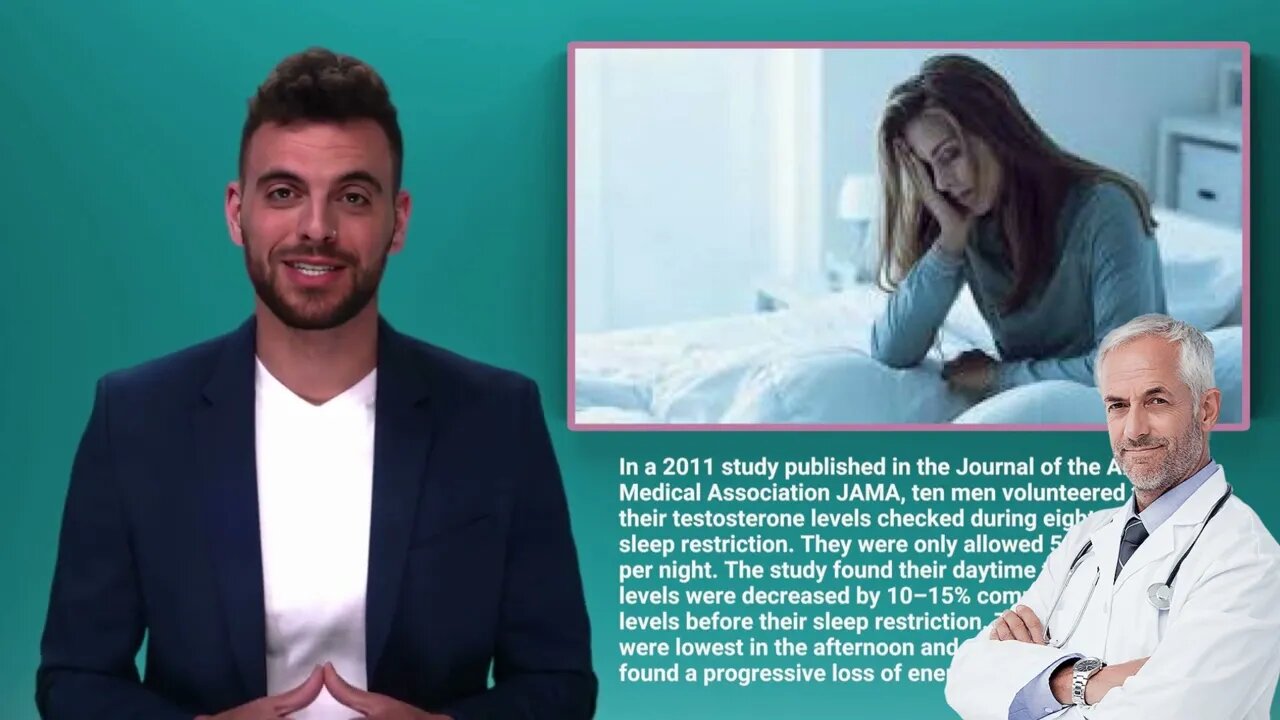Premium Only Content

Sleep Disturbances _ AAI Rejuvenation Clinic _ Health Education
Sleep disturbance affects every facet of our existence. Many sleep-related problems can be overcome with testosterone therapy. Men with lower testosterone levels have reduced sleep efficiency, with increased nocturnal awakenings and less slow-wave (REM) sleep. Studies have shown that sleep disturbance caused by sleep apnea, a chronic breathing problem, may be linked to low testosterone levels.
In a 2011 study published in the Journal of the American Medical Association (JAMA), ten men volunteered to have their testosterone levels checked during eight nights of sleep restriction. They were only allowed 5 hours of sleep per night. The study found their daytime testosterone levels were decreased by 10–15% compared with the levels before their sleep restriction. Testosterone levels were lowest in the afternoon and evening. The study also found a progressive loss of energy over the week.
Thus, a direct correlation exists between testosterone levels and sleep quantity and quality. Here at AAI Rejuvenation Clinic, we’re waiting to help you. Our services are discrete and confidential. Contact us today at (866) 224-5698 or complete our medical history form. Our trained wellness team is eager to get you started on the path to a better night’s sleep.
Hormones can play a significant role in regulating sleep, and imbalances in hormone levels can contribute to sleep disturbances. Some hormones that are particularly important for rest include:
Melatonin: Melatonin is a hormone produced by the brain’s pineal gland, and it plays a critical role in regulating the sleep-wake cycle. Melatonin typically rises in the evening, promoting sleep, and falls in the morning, promoting wakefulness.
Cortisol: Cortisol is a hormone primarily produced in the adrenal glands and plays a critical role in the body’s stress response. Cortisol levels typically follow a diurnal pattern, peaking in the morning and declining throughout the day. Imbalances in cortisol levels can contribute to difficulty falling asleep or staying asleep.
Growth hormone: Growth hormone is primarily produced by the pituitary gland and plays a critical role in regulating metabolism and promoting tissue repair and regeneration. Growth hormone levels typically peak during deep sleep, and imbalances in growth hormone levels can contribute to difficulty achieving deep, restful sleep.
Thyroid hormones: Thyroid hormones play a critical role in regulating metabolism and energy production, and imbalances in thyroid hormone levels can contribute to difficulty falling asleep or staying asleep.
**NOTE** The content on this page is subject to interpretation and is the opinion of the content writer. We do not claim it to be fact. We'd like to encourage you to consult a medical doctor before taking any prescribed medications or supplements.
Conclusion:
Supporting Hormone health is essential for overall well-being and vitality. By incorporating regular exercise, proper nutrition, adequate sleep, stress management techniques, and IV therapy, you can help maintain optimal testosterone levels and lead a healthy, balanced life. Always consult a healthcare professional before making significant changes to your lifestyle or starting any new treatments to ensure they suit your needs.
At AAI Rejuvenation Clinic, we advise anyone to think seriously about beginning Hormone treatment if there is no medical need. However, we will take every precaution to ensure that you read your program’s positive benefits by providing the latest at-home hormonal mouth-swab testing to ensure we are continually monitoring your progress and aware of any adverse side effects. Fill out the Medical History Form, or if you need more information, call us at (866) 224-5698 or (866) AAI-Low-T.
Website:
Social Media Information:
https://www.pinterest.com/antiagingr/
https://twitter.com/AARejuvenation
https://www.facebook.com/aarejuvenationclinics/
More Information on Sleep Disturbances:
-
 10:58
10:58
Degenerate Jay
21 hours ago $7.19 earnedThe Rejected Deadpool And Wolverine Joke That Was Too Far For Disney
64.9K4 -
 13:00
13:00
Dermatologist Dr. Dustin Portela
14 hours ago $3.38 earnedAnother Insurance Company Harming Patients - Doctor Explains
31.5K4 -
 52:32
52:32
Survive History
20 hours ago $5.57 earnedCould You Survive in King George's Redcoats During the Jacobite Rising?
28.1K3 -
 17:53
17:53
Fit'n Fire
19 hours ago $2.06 earnedA Rifle for the Family -- BCM MK2 BFH and Gunnr Optics Odin 1-10x28mm LPVO
18.5K2 -
 1:03:52
1:03:52
GrassRootsWarriorNetwork
1 month agoWe The People Are The News Now While MSM Is On It’s Way Out - YourNews.com with Sam Anthony
17.4K -
 21:12
21:12
DeVory Darkins
14 hours ago $19.45 earnedGavin Newsom gets what he deserves after NBC Reporter FACT CHECKS his Lies
75.2K60 -
 1:57:13
1:57:13
MyronGainesX
14 hours agoFormer Fed Explains Sting That Led To The Murder Of A State Trooper
90.1K21 -
 3:56:27
3:56:27
Due Dissidence
20 hours agoNewsom ROASTED For Pod Save Interview, Candace Owens CALLS OUT Elon, Ian Carroll RATIOES Israel Post
82K56 -
 2:16:17
2:16:17
TheSaltyCracker
12 hours agoLooters Descend on LA ReeEEeE Stream 01-12-25
158K342 -
 40:32
40:32
Man in America
17 hours agoRockefeller Medicine COLLAPSES as God's Natural Healing Takes Over w/ Angie Tomky
58.6K37